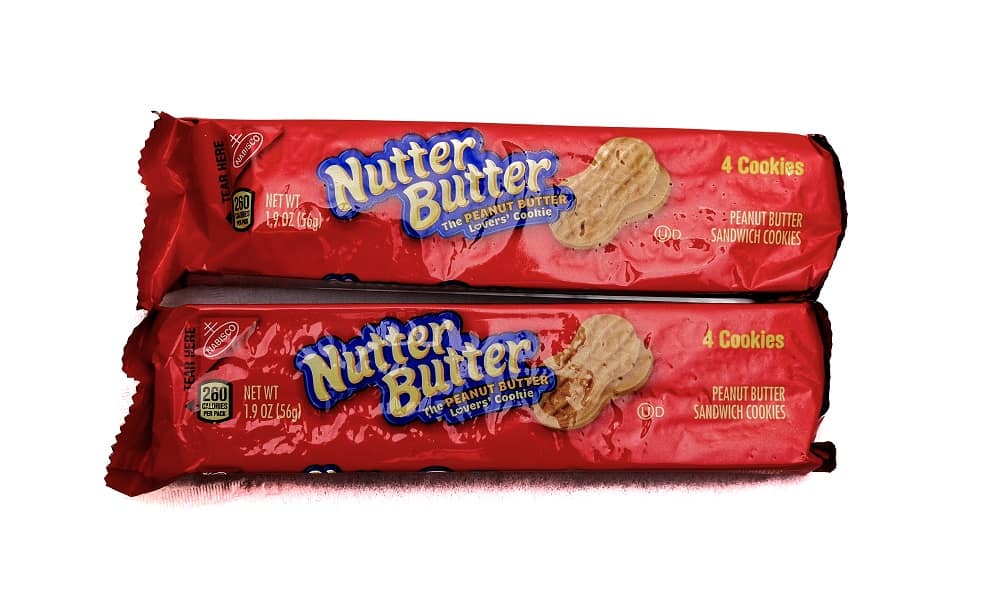Nutter Butters are a widely known sandwich cookie brand that is characterized by their peanut design. First introduced in 1969 by Nabisco, the same company that also produces Belvita, Ritz Crackers, Wheat Thins, Teddy Grahams, and Chips Ahoy! While flavored variants of the cookie exist, the flavor profile of Nutter Butter characteristically revolves around peanut butter.
Nutter Butters are essentially vegan since they do not contain any obvious animal product or derivative. Perhaps the only ingredient in Nutter Butters that some vegans would be wary of is sugar. A common sweetener used in the food and beverage industry, sugar is often considered a gray area ingredient because of the difficulty in determining if it is truly vegan or not.
Table of Contents
Are Nutter Butters Vegan?

According to dietary vegans, Nutter Butters should be perfectly fine for their diets and lifestyles since the sandwich cookie brand does not contain any animal product or derivative outright. Looking at the ingredients list of the product, it seems that Nutter Butters follows a general recipe similar to that of a baked or fried pastry.
If there is anything vegans would be concerned about in Nutter Butters, it would probably have to be sugar. Although sugar is conventionally derived from plants, it can still become non-vegan depending on how it was produced. Some sugar companies use bone char, an animal product, when they process their sugar. However, even when this is a possible scenario, many vegans would still consider sugar to be a vegan-friendly ingredient. It would really depend on how strict the vegans in question are.
Nutter Butter Ingredients List
The list of ingredients of Nutter Butter includes (1): unbleached enriched flour (wheat flour, niacin, reduced iron, thiamine mononitrate [vitamin B1], riboflavin [vitamin B2], folic acid), sugar, peanut butter (peanuts, corn syrup solids, hydrogenated rapeseed and/or cottonseed and/or soybean oils, salt, peanut oil), high fructose corn syrup, canola oil, palm oil, whole grain wheat flour, salt, leavening (baking soda, and/or calcium phosphate), cornstarch, soy lecithin, artificial flavor.
The Mondelez website (2) that holds Nutter Butter information shows that there are various variants of the snack such as the Nutter Butter Single Serve, Nutter Butter Bites Big Bag, Nutter Butter Bites Singe Serve Bag, Nutter Butter Bites King Size, Nutter Butter Convenience Pack, and so on. However, it would appear that the variants of the snack are more concerned about the shape of the cookie and the size of the pack. Thus, it is safe to assume that the ingredients found across the different types should be highly similar, if not the same.
Sugar
Sugar is a common ingredient, especially in snacks such as Nutter Butters. Different ingredients would typically serve various functions, but sugar is primarily used as a sweetener. Although sugar is typically obtained from a plant source such as sugarcane or sugar beets, it can still be non-vegan depending on how it was produced.
Crude sugar extracted from a certain plant source is already edible and fit for consumption. However, many sugar companies would further refine their sugar to make it more appealing to the mass market. Further refinement of sugar makes the product whiter and finer. Many processes involved in refining sugar are essentially physical or chemical. However, there is one method that can sometimes involve a biological component.
Filtration is a common way to refine sugar. By passing sugar juice through a filter, it helps increase the purity of the sugar by removing non-sugar components. Different companies can use different filtration methods such as the use of granulated carbon. However, the issue vegans have with sugar is that some sugar companies would use bone char to filter their sugar. Bone char is the charred and skeletal remains of animals. Although it is a cheap and effective filter, sugar that has been processed using bone char can no longer be considered vegan since it is an animal product.
Sugar labels are often very simple and would not include information pertaining to how it was processed. This makes determining if a sugar product was produced with the use of bone char or not. The issue is further exacerbated when the sugar is found in a food product or beverage. This is because large food manufacturers can have multiple sources of sugar, thus making it even more difficult in tracing the necessary information to determine if the sugar a product contains is truly vegan or not.
The use of bone char in the sugar industry is more prevalent in the US which is why vegans from other parts of the world are more confident that the sugar in their respective countries is indeed vegan.
References
1. https://www.foodservice-snacks-desserts.com/
2. https://www.foodservice-snacks-desserts.com/
Featured Image Editorial Credit JJava Designs / Shutterstock.com




